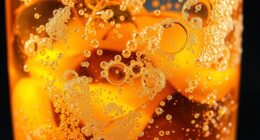Industrial grade potassium nitrate is a highly soluble salt with a crystalline, white appearance and a salty taste. You’ll find it widely used in manufacturing explosives, pyrotechnics, and fertilizers because of its purity and water solubility. It acts as an oxidizer and must be managed carefully with protective gear. Proper storage guarantees safety and performance. To understand how its properties influence different applications, keep exploring more detailed information.
Key Takeaways
- Industrial grade potassium nitrate is a highly soluble, crystalline salt used mainly in explosives and pyrotechnics.
- Its purity level meets specific standards suitable for industrial applications but is less refined than pharmaceutical or food-grade variants.
- Proper handling requires safety measures such as protective gear, and storage in a cool, dry environment to prevent stability issues.
- It acts as an oxidizer, enhancing combustion in fireworks, gunpowder, and other explosive compositions.
- Understanding its properties ensures safe, efficient application and compliance with safety and performance standards.

Industrial grade potassium nitrate is an essential chemical compound widely used in various manufacturing and agricultural applications. When you handle this substance, you’re dealing with a highly soluble salt that offers a range of practical uses due to its unique chemical properties. It’s produced to meet specific purity standards suitable for industrial processes, but it’s not as refined as pharmaceutical or food-grade potassium nitrate. This makes it ideal for applications where purity is important but not critical enough to require the highest levels of refinement. As you work with it, you’ll notice that its crystalline structure is usually white and odorless, with a salty taste, which makes it relatively easy to identify and handle safely with proper precautions.
Industrial grade potassium nitrate is a versatile, water-soluble salt used in manufacturing and agriculture with safety precautions.
In manufacturing, you might use potassium nitrate as a key ingredient in the production of explosives, such as gunpowder and other pyrotechnic compositions. Its oxidizing properties help sustain combustion, making it an essential component in these formulations. When you mix it with charcoal and sulfur, you create a stable and effective explosive compound. Its role in fireworks is equally significant; it acts as an oxidizer that supports the burning of other materials, producing spectacular visual effects. In these contexts, the purity level of industrial grade potassium nitrate is sufficient to ensure safety and consistent performance. Additionally, its solubility in water facilitates precise control over its application in various processes. You should also understand that handling industrial grade potassium nitrate requires proper safety measures. Though it’s not highly toxic, it’s an oxidizer and can enhance the combustion of other materials. Keep it stored in a cool, dry place away from combustible substances, and use protective gear like gloves and goggles during handling. Knowing its properties and applications helps you utilize potassium nitrate effectively and safely across various industries. Whether you’re involved in manufacturing or agriculture, understanding its role and proper handling can optimize your processes and ensure safety. Being aware of handling precautions can help prevent accidents and promote safe usage. Additionally, understanding the purity standards for this grade can help ensure that your application meets the required safety and performance criteria. A thorough understanding of application methods can further improve the efficiency and safety of your work with potassium nitrate. Moreover, understanding storage recommendations ensures the material remains stable and safe over time.
Frequently Asked Questions
What Are the Environmental Impacts of Industrial Grade Potassium Nitrate?
You might wonder about the environmental impacts of industrial grade potassium nitrate. It can contribute to water pollution if improperly disposed of, affecting aquatic life. Its production releases some pollutants, and excess use in agriculture can lead to soil degradation and nutrient runoff. However, when managed correctly, it’s relatively safe. You should always handle and dispose of it responsibly to minimize environmental harm and promote sustainable practices.
How Does Potassium Nitrate Compare to Other Nitrates in Industrial Applications?
You’re asking how potassium nitrate compares to other nitrates in industrial uses. Potassium nitrate stands out because it’s highly soluble, non-toxic, and effective in applications like fertilizers, food preservation, and fireworks. Unlike sodium nitrates, it’s less corrosive and more stable at high temperatures. Its unique properties make it preferable in certain industries, especially where safety and performance are critical. So, it’s often chosen over other nitrates for specific, demanding applications.
Are There Specific Safety Protocols for Handling Large Quantities?
When handling large quantities of potassium nitrate, you need to follow strict safety protocols. Always wear appropriate protective gear like gloves, goggles, and respirators. Store it in a cool, dry, well-ventilated area away from heat or open flames. Keep containers sealed and clearly labeled. Follow safety guidelines, including proper handling techniques and emergency procedures, to prevent accidents or hazardous reactions. Regular training guarantees you stay aware of safety measures.
Can Industrial Grade Potassium Nitrate Be Used in Food Preservation?
Sure, you can consider using industrial-grade potassium nitrate for food preservation, but proceed with caution. It’s essential to understand that this grade often contains impurities not suitable for consumption. You should consult food safety standards and regulations before using it, and always prioritize purity and proper processing. If in doubt, opt for food-grade potassium nitrate, ensuring safety, satisfaction, and compliance in your culinary or preservation pursuits.
What Are the Legal Regulations Surrounding Its Commercial Use?
You need to know that legal regulations for commercial use of industrial grade potassium nitrate differ by country. In many places, it’s restricted to specific industries like fertilizers or fireworks, and using it in food preservation is often prohibited without proper authorization. You should check local laws and regulations, obtain necessary licenses, and verify you’re compliant to avoid legal issues or penalties.
Conclusion
Just as alchemists once sought to unlock nature’s secrets, understanding industrial-grade potassium nitrate reveals its true power. By knowing its applications and safety measures, you harness its potential responsibly. Remember, with great knowledge comes great responsibility—like a modern-day wizard wielding a potent tool. So, stay informed, handle it carefully, and access the many possibilities this versatile compound offers. Your journey into its world is just beginning—embrace it with curiosity and caution.









